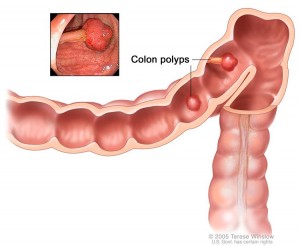Soul Singer, Teddy Pendergast dies of colon cancer

Philadelphia soul singer, Tendy Pendergast, 59, who revived a singing career despite being paralyzed in a 1982 car accident, lost his battle with colon cancer. Pendergast was originally the lead singer for Harold Melvin and the Blue Notes, famous for songs such as “If You Don’t Know Me by Now” and “I Miss You.” He then went on to a solo career with hits that included “I Don’t Love You Anymore,” “Close the Door,” and “Turn off the Lights.” In 1982 he was in a severe car accident which left him paralyzed from the waist down. Despite this, he began singing again, and released an album entitled ” Love Language.” He was diagnosed with colon cancer eight month ago, and underwent surgery at that time, but apparently had a difficult recovery and succumbed to the disease.
Colorectal cancer is the second most common cancer killer overall and third most common cause of cancer-related death in the United States in both males and females.
The Colon:
The colon is part of the digestive system. It forms a long, muscular tube called the large intestine (also called the large bowel). The colon is the first 4 to 5 feet of the large intestine, with the rectum at the last several inches.
Partly digested food enters the colon from the small intestine. The colon removes water and nutrients from the food and turns the rest into waste (stool). The waste passes from the colon into the rectum and then out of the body through the anus.
Almost all colon cancer starts in glands in the lining of the colon and rectum. Nearly all colon cancers begin as noncancerous (benign) polyps, which slowly develop into cancer. This is why screening for colon cancer with colonoscopy is so effective. (This will be a good topic for a future blog entry.)
A polyp is an abnormal growth of tissue projecting from a mucous membrane. If it is attached to the surface by a narrow elongated stalk it is said to be pedunculated. If no stalk is present it is said to be sessile.
Risk factors for colon cancer:
- Age over 50
- African American and eastern European descent
- Diet:
- High in red or processed meat
- high fat
- low fiber
- Cancer elsewhere in the body
- Presence of polyps in the colon or rectum
- Inflammatory bowel disease (Crohn’s disease or ulcerative colitis)
- Family history of colon cancer
- Personal history of breast cancer
- Certain genetic syndromes:
- Hereditary nonpolyposis colorectal cancer(HNPCC)
- Familial adenomatous polyposis (FAP).
- Smoking cigarettes and drinking alcohol
For more information:
| Resounding Health(tm) Colon Cancer |


























0 comments